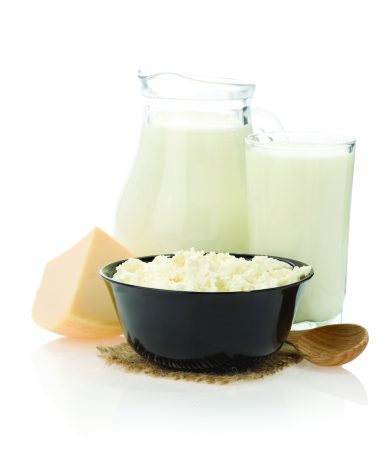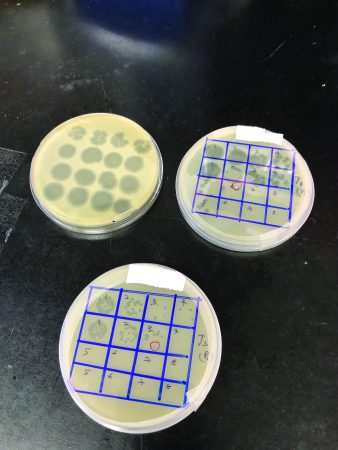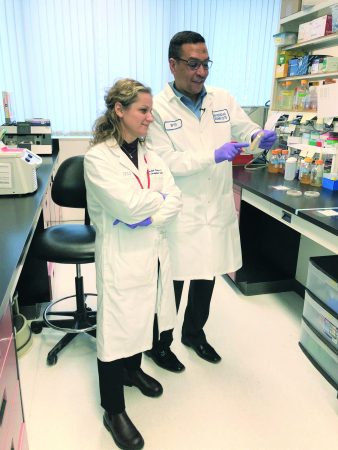
Chemical-free food safety
By Lilian Schaer for Canadian Food Innovation Network
Research & Development Agriculture and Agri-Food Canada Canadian Food Innovation Network Food innovation food safety Gay Lea Foods Co-operative Photo © Gay Lea Foods Co-operative Ltd.
Photo © Gay Lea Foods Co-operative Ltd. A Canadian dairy co-operative has teamed up with Agriculture and Agri-Food Canada to develop a chemical-free way to prevent the risk of Listeria in food processing environments.
Listeria monocytogenes is one of the most common food safety risks for humans, and many outbreaks of Listeria-associated foodborne illnesses have been traced back to fresh and ready-to-eat foods like dairy, meat, eggs, vegetables, and seafood. Although the incidence rate in Canada is relatively low, improving food safety is an ongoing goal of the country’s food and beverage processing sector.
Effective sanitation is key to controlling Listeria in food processing environments where it typically resides in biofilms. But this currently involves the use of strong chemicals that can have a negative impact on the environment as well as lead to the development of antimicrobial resistance.
“Listeria is a problematic organism and requires a good sanitation to minimize its loads in the food processing environment and inhibit cross contamination,” says research scientist Dr. Hany Anany of Agriculture and Agri-Food Canada’s Guelph Research and Development Centre. “Phages can be considered as a very promising tool as an antimicrobial agent that can tackle Listeria.”

Anany is working with Gay Lea Foods to identify and test the effectiveness of natural antimicrobial agents – lytic bacteriophages (phages) or bacterial viruses that will specifically target only Listeria bacteria without harming other beneficial species.
This project is part of Canadian Food Innovation Network (CFIN) Emerging Science Research Cluster.
“We take sanitation very seriously; we are also attentive to consumer demand for food safety as well as their growing preference for natural products. We know there is data available on using biological agents to reduce pathogenic bacteria in various stages of food production,” explains Anilda Guri, lead research scientist at Gay Lea Foods. “So, we took this opportunity to be the first ones in dairy to support this type of research. This is not a mitigation situation, but a way to be proactive for the future.”

Anilda Guri and Hany Anany.
Anany’s research involves identifying different naturally occurring Listeria phages and evaluating their biosanitation potential against Listeria biofilms in a simulated dairy processing environment.
The goal is to have a new biosanitation agent that can be used to sanitize equipment, food contact surfaces and drains in food processing plants. This will be an environmentally conscious solution that will be an effective alternative to antimicrobial agents.
“Finding green alternatives that will help promote natural compounds to eradicate or control Listeria is very forward-looking on the part of Gay Lea Foods,” says Anany. “More ecofriendly alternatives will result in better productivity and better quality in the Canadian food processing sector – and this approach can be expanded to other bacteria in the food industry beyond the dairy sector.”
According to Guri, the co-operative is appreciative of the cluster funding that is supporting this proof-of-concept research.
“We are committed to innovation, so we want to look out for any opportunity that shows up. We’re more than grateful for this funding – it’s all about innovation and great commitment to the future,” she notes.
Why is this innovation important?
- Helps meet consumer demand for natural antimicrobial agents
- Improves food safety and human health
- Reduces environmental impact of chemical cleaners and sanitizers
What does this project mean to Canada’s food processing industry?
It is anticipated this innovation will enable food and beverage processors to satisfy consumer demand for more natural antimicrobial agents and can be expanded beyond Listeria to address bacteria-driven food safety concerns across the broader food processing sector.
About Gay Lea Foods Co-operative Ltd.
Gay Lea Foods is a leading Canadian food co-operative. Dedicated to innovation, the development of high-quality products and growing the market for Canadian milk, the co-op is 100% Canadian-owned with members on more than 1,400 Ontario and Manitoba dairy farms. The co-operative’s award-winning products include butter, sour cream, whip cream, cheese, and cottage cheese.
About the project team
Dr. Hany Anany is a research scientist in bacteriophage biology and application with Agriculture and Agri-Food Canada’s Guelph Research and Development Centre. He holds a BSc and an MSc in microbiology from Ain Shams University in Egypt and a PhD in food microbiology from the University of Guelph.
Dr. Anilda Guri is a senior research scientist with Gay Lea Foods, with an MSc in natural products and biotechnology from the Mediterranean Agronomic Institute of Chania in Greece and a PhD in applied chemistry from the Agricultural University of Tirana in Albania. She has also completed postdoctoral research on dairy structures at the University of Guelph’s Department of Food Science.
The Canadian Food Innovation Network Emerging Science Research Cluster is funded in part through the AgriScience Program under the Canadian Agricultural Partnership, a federal-provincial-territorial initiative. For more information, contact Laura Sider, science co-ordinator, CFIN.
Print this page